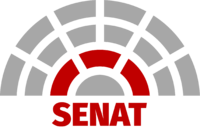National Senate of Zhousheng: Difference between revisions
m ({{Main|Legislative process in Zhousheng}}) |
No edit summary |
||
| Line 133: | Line 133: | ||
==History== | ==History== | ||
The Senate of Zhousheng was originally formed 1943 with the creation of the Zhoushi Federation. Originally, it was elected using using a [[wikipedia:First-past-the-post voting|plurality system]] in single-mandate constituencies, numbering 99 in total. The term of the Senate was the same as the one of the Assembly and their elections were synchronised - a thing that was kept to this day. | |||
This system was changed with a new constitution in 1984, replacing the first-past-the-post election with an [[wikipedia:Instant-runoff voting|instant-runoff]] system. | |||
This system was kept until the [[2001 Zhoushi protests]], caused by the highly problematic [[2001 Zhoushi parliamentary election|2001 parliamentary election]]. Due to the sweeping victory in single mandate constituencies, the Senate came under the full control of the People's Party, which in turn failed to form a government with any other party, failing to gain a majority in the National Assembly. Following allegations of election fraud and of political tampering, the People's Party pronounced itself a single-party government and announced the dissolution of the Assembly, explaining that the confidence has been gained through the Senate, and that despite almost 60 years of traditions, the constitution does not specify, that elections must take place at the same time to both of the houses. This caused a crisis, which was eventually ended by the Constitutional Court officially disbanding the Parliament and calling for a snap election of both chambers. | |||
In the meantime, the government of national unity was declared, which then provisionally changed the electoral law for the [[2002 Zhoushi legislative election|2002 snap election]], changing the electoral system of the upper house to [[Jorken method]], proposed by a [[Renia|Renish]] mathematician [[Ƈestꭈ Jorken]]. Following the establishment of the new convocation of the Parliament, this change was deemed a success and was declared permanent. | |||
After the reform, the rights of both chambers were given the same rights and priviledges, giving the Senate the right to vote on the confidence of the government, clearing the inconsistencies of the 1983 Constitution. | |||
===Past elections=== | ===Past elections=== | ||
Revision as of 08:34, 21 December 2022
This article is incomplete because it is pending further input from participants, or it is a work-in-progress by one author. Please comment on this article's talk page to share your input, comments and questions. Note: To contribute to this article, you may need to seek help from the author(s) of this page. |
National Senate of the Congress of the Federal Republic of Zhousheng Narodƞi Senat Federalƞi Republiky Ʒөшengu | |
|---|---|
 Logo of the National Senate | |
| Type | |
| Type | Upper house of the Congress of Zhousheng |
| History | |
| Preceded by | Assembly of the Zhoushi Union |
| Leadership | |
Chairman | Igor Ȝemlin, LDΛPƷ |
| Structure | |
| Seats | 99 |
 | |
Political groups | Government (73)
Opposition (25)
|
| Elections | |
| Jorken method | |
Last election | 5 June 2020 |
Next election | Before 5 June 2024 |
The National Senate of the Federal Republic of Zhousheng (Zhoushi: Narodƞi Senat Federalƞi Republiky Ʒөшengu) is the 99-members large upper house of the Congress of Zhousheng.
Elections
TBA
Snap elections
TBA
Rights
TBA
Legislative process
TBA
History
The Senate of Zhousheng was originally formed 1943 with the creation of the Zhoushi Federation. Originally, it was elected using using a plurality system in single-mandate constituencies, numbering 99 in total. The term of the Senate was the same as the one of the Assembly and their elections were synchronised - a thing that was kept to this day.
This system was changed with a new constitution in 1984, replacing the first-past-the-post election with an instant-runoff system.
This system was kept until the 2001 Zhoushi protests, caused by the highly problematic 2001 parliamentary election. Due to the sweeping victory in single mandate constituencies, the Senate came under the full control of the People's Party, which in turn failed to form a government with any other party, failing to gain a majority in the National Assembly. Following allegations of election fraud and of political tampering, the People's Party pronounced itself a single-party government and announced the dissolution of the Assembly, explaining that the confidence has been gained through the Senate, and that despite almost 60 years of traditions, the constitution does not specify, that elections must take place at the same time to both of the houses. This caused a crisis, which was eventually ended by the Constitutional Court officially disbanding the Parliament and calling for a snap election of both chambers.
In the meantime, the government of national unity was declared, which then provisionally changed the electoral law for the 2002 snap election, changing the electoral system of the upper house to Jorken method, proposed by a Renish mathematician Ƈestꭈ Jorken. Following the establishment of the new convocation of the Parliament, this change was deemed a success and was declared permanent.
After the reform, the rights of both chambers were given the same rights and priviledges, giving the Senate the right to vote on the confidence of the government, clearing the inconsistencies of the 1983 Constitution.
Past elections
TBA
See also
- Government of Zhousheng
- National Assembly of the Federal Republic of Zhousheng
- Congress of the Federal Republic of Zhousheng